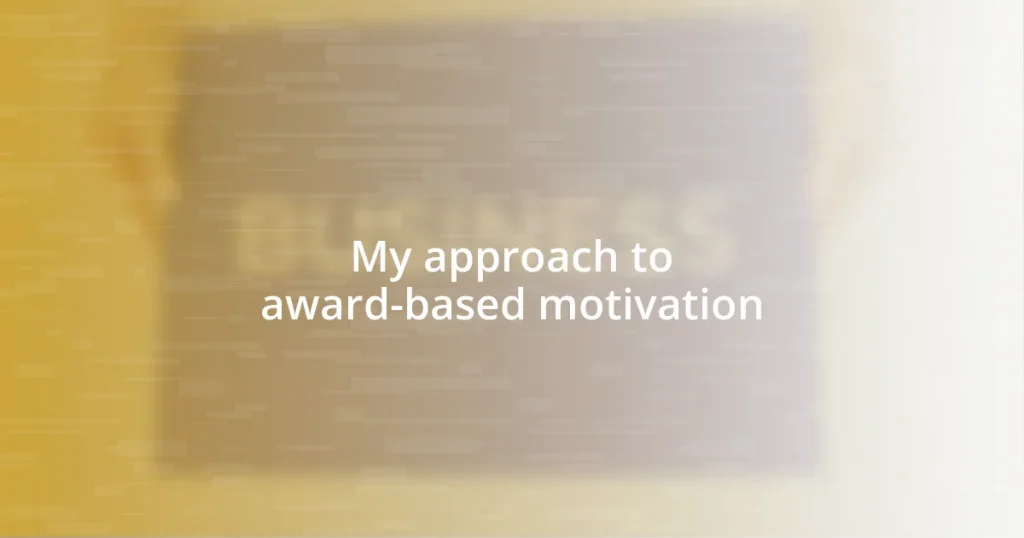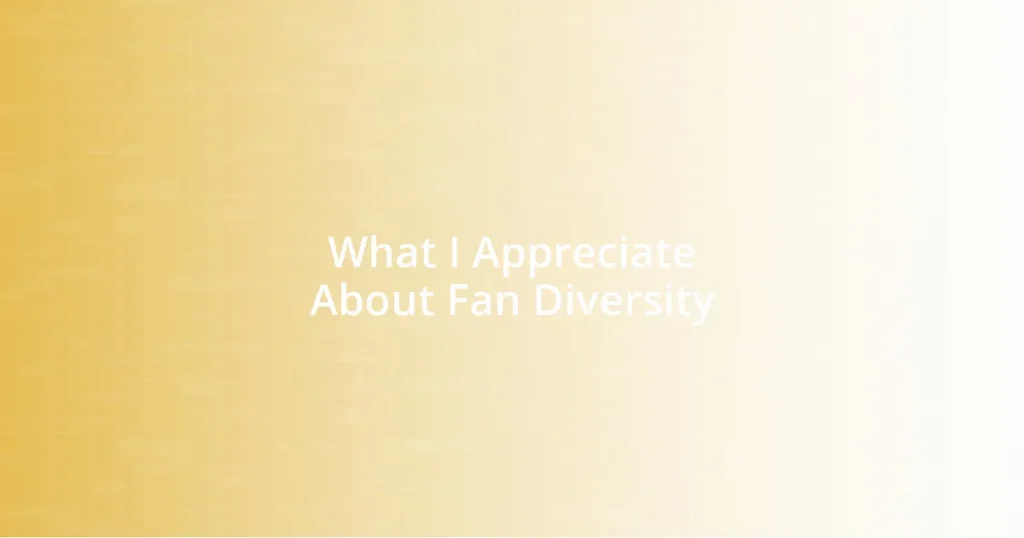Key takeaways:
- Effective awards align with individual values and preferences, enhancing engagement and motivation.
- Balancing intrinsic and extrinsic motivation is essential to avoid dependency on rewards and promote genuine fulfillment.
- Regular recognition of small achievements fosters a positive environment, boosting team spirit and collective productivity.

Understanding award-based motivation
Award-based motivation revolves around the idea of rewarding individuals for their efforts and achievements. I remember when I worked on a project that seemed insurmountable until my supervisor promised us a team lunch if we met our deadline—suddenly, that looming deadline felt less daunting. Have you ever noticed how a simple prize can elevate your enthusiasm? It’s fascinating how external rewards can boost performance, driving people to reach goals they might otherwise shy away from.
One key insight I’ve gathered through my experiences is that not all rewards have the same impact. In my early career, I found that a heartfelt note of appreciation often resonated more deeply than a monetary bonus. This raised an essential question in my mind: What does a true sense of accomplishment look like? Genuine motivation stems from recognition that feels personal and meaningful rather than simply transactional.
Moreover, it’s important to consider the fine line between motivation and dependency on rewards. I’ve seen talented individuals shift their focus to chasing accolades rather than pursuing their passions. How do we strike that balance? By fostering an environment where intrinsic motivation flourishes alongside external rewards, we can create a more sustainable approach that nurtures growth and fulfillment.
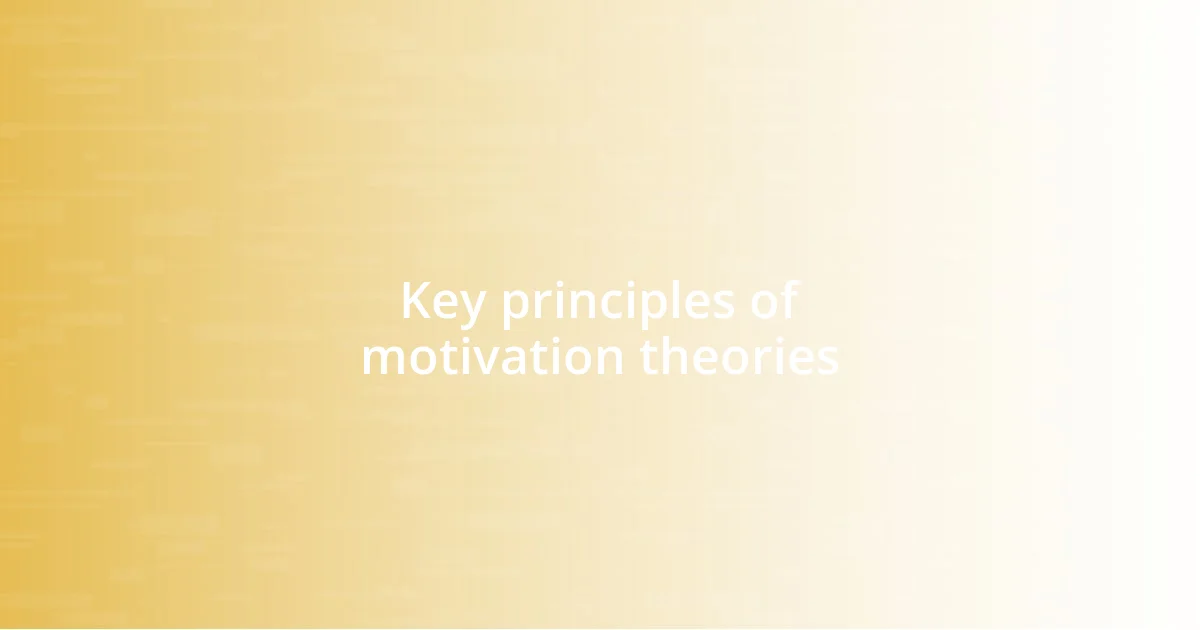
Key principles of motivation theories
Understanding the various principles of motivation theories can significantly enhance how we approach award-based motivation. For instance, Maslow’s Hierarchy of Needs emphasizes fulfilling basic needs before pursuing higher-level goals. I can’t help but think back to a time when I was juggling personal challenges while trying to meet workplace expectations; that framework reminded me that addressing those initial needs — like feeling secure and valued — was essential for me to aim higher.
Another vital principle comes from Herzberg’s Two-Factor Theory, which differentiates between hygiene factors and motivators. When I led a team of volunteers, simply providing snacks and a comfortable space (hygiene factors) kept everyone coming, but it was the gratitude shown for their hard work (motivators) that really drove them to go above and beyond. It’s evident to me that while the basics are crucial, it’s the emotional connection that truly propels us forward.
Lastly, the Expectancy Theory underscores the belief that motivation is influenced by the expected outcomes of our efforts. I once had a mentor who always linked our personal goals to potential outcomes, helping us visualize success. I found that by aligning personal interests with rewards, we felt more driven and excited to work toward them. The combination of these insights has profoundly shaped my understanding of motivation and the nuanced role awards play in enhancing it.
| Motivation Theory | Key Principle |
|---|---|
| Maslow’s Hierarchy of Needs | Addressing basic needs is essential before higher-level motivation can occur. |
| Herzberg’s Two-Factor Theory | Differentiates between hygiene factors (basic needs) and motivators (factors leading to satisfaction). |
| Expectancy Theory | Motivation is influenced by the expected outcomes of efforts. |
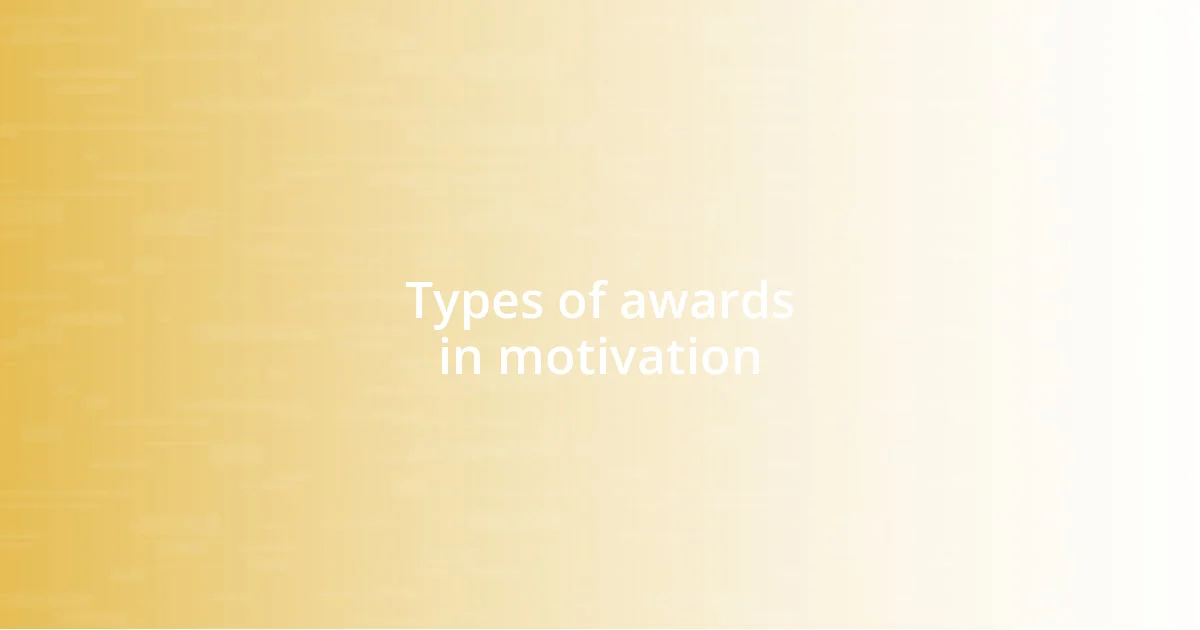
Types of awards in motivation
When considering how awards can motivate, I often think about the different types that exist. They may vary in form, but each serves a unique purpose in fostering engagement. For example, tangible rewards like gift cards or cash bonuses can provide immediate gratification, while intangible rewards like recognition and praise create deeper emotional connections. I vividly remember receiving a public shout-out from my manager during a team meeting for my contributions to a project. That moment filled me with pride and encouraged me to strive for even greater achievements.
Here’s a bite-sized list showcasing various types of awards that can effectively motivate individuals:
- Monetary Rewards: Cash bonuses, gift cards, or raises that directly impact financial well-being.
- Public Recognition: Acknowledgment in team meetings or company newsletters that promotes a sense of belonging.
- Personalized Awards: Tailored gifts or experiences that resonate with individual interests, showing thoughtfulness.
- Career Advancement: Opportunities for promotions or special projects that recognize hard work and commitment.
- Team-based Rewards: Incentives like group outings or team lunches that foster camaraderie and a collective sense of achievement.
Each of these award types has a distinct role, but the key is finding the right balance that resonates with each individual. In my experience, blending immediate incentives with meaningful acknowledgments has proven to be the most effective strategy in driving motivation.

How to implement awards effectively
When implementing awards effectively, it’s crucial to align them with the values and interests of the individuals receiving them. I once organized a recognition event where we asked team members what types of awards excited them most. The varied responses revealed that some craved the spotlight of public recognition, while others preferred more personal, low-key acknowledgments. Knowing your audience can make all the difference; it’s about creating an experience that resonates deeply.
Another key aspect is the timing of the awards. I’ve found that offering awards shortly after a significant achievement feels most impactful. For instance, after completing a challenging project, presenting a token of appreciation right away creates a powerful connection to the effort put forth. Don’t you think it feels more rewarding when your hard work is acknowledged immediately? This approach not only uplifts morale but also reinforces the behaviors you want to motivate.
Lastly, follow through is essential. It’s one thing to hand out awards, but it’s also vital to discuss their significance with the recipients. I recall a time when I sat down with a colleague who received an award, and together we reflected on the journey that led to that moment. It brought a sense of closure and fulfillment, turning a simple award into a memorable milestone. By sharing stories and insights behind the awards, you create a narrative that enriches the experience for everyone involved.
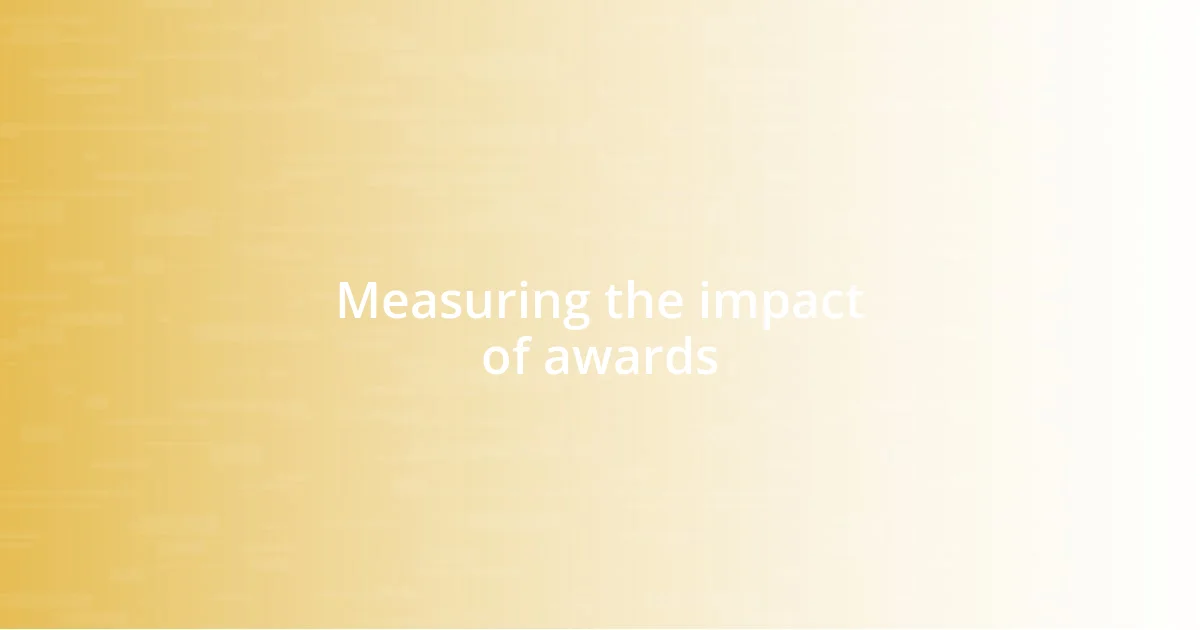
Measuring the impact of awards
Measuring the impact of awards can be quite revealing when you look closely at the outcomes. In my own experience, I’ve noticed that tracking employee engagement scores before and after implementing an awards program can highlight tangible shifts in motivation. For instance, I once conducted a simple survey after a recognition event, and the increase in positive responses stunned me—it was as if a wave of enthusiasm washed over the team. Can you imagine how that uplifted everyone’s spirits?
Another interesting way to gauge the effectiveness of awards is by observing changes in performance metrics. After rolling out team-based rewards, I found that our overall productivity spiked noticeably. It was as if the collective goal ignited a competitive spirit among the team members, pushing them to achieve more. This revealed a great truth: awards can effectively encourage not just individual efforts, but also promote synergy within groups. Have you ever witnessed a similar effect in your environment?
Ultimately, I believe that qualitative feedback is just as crucial as quantitative data. When we asked team members to share their feelings about the recognition they received, the stories poured in—each one unique and powerful. One employee described how a personal note left by a supervisor made a tougher day feel brighter, highlighting how even small gestures can create significant emotional impacts. This blend of hard data and heartfelt anecdotes really underscores how awards can profoundly influence workplace culture. Wouldn’t you agree that it’s these personal connections that truly elevate the experience?
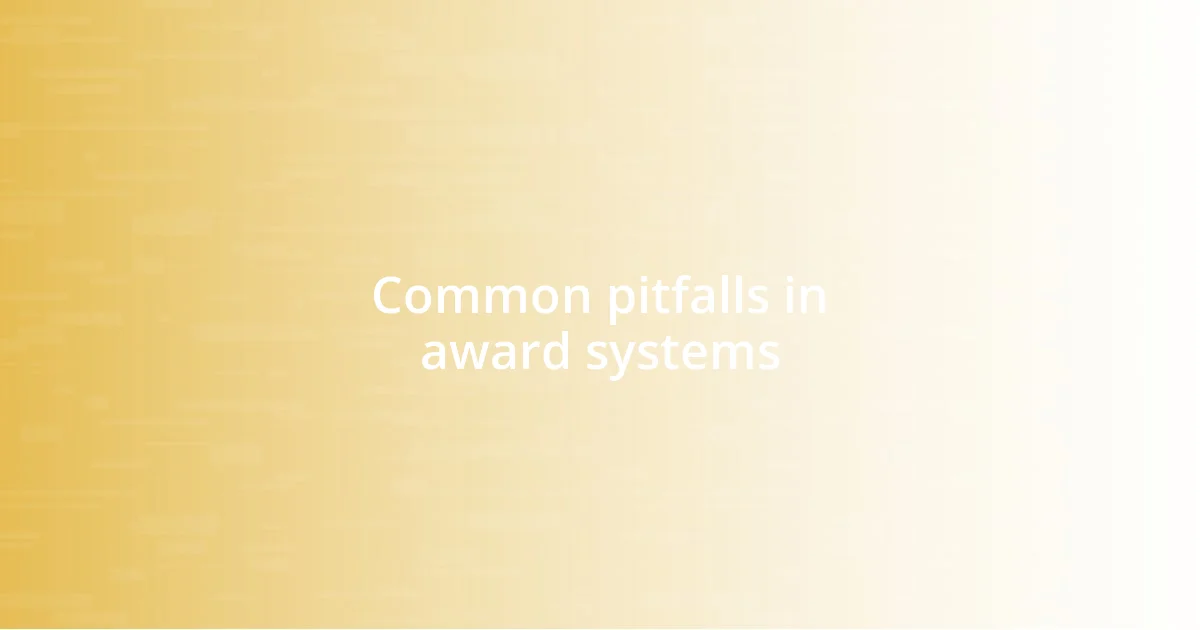
Common pitfalls in award systems
While award systems can be motivating, they often fall into common pitfalls. One major issue I’ve encountered is over-reliance on awards, leading to a perception that recognition only comes through prizes. I remember a time when one of my team members expressed frustration, feeling their daily contributions went unnoticed until an award was handed out. That lingering thought had me questioning whether our system genuinely celebrated consistent effort or merely spotlighted occasional achievements. Isn’t it vital to recognize hard work consistently rather than only during moments of award distribution?
Another pitfall involves the competitive nature of awards. I once initiated a program where the top seller received a lavish prize, but soon I noticed a divide among team members, creating tension rather than motivation. The spirit of collaboration took a hit as individuals began to focus solely on personal gain. Have you ever experienced that shift? It made me realize that while a little competition can be healthy, it’s crucial to strike a balance between individual recognition and fostering teamwork.
Lastly, awards can inadvertently lead to feelings of exclusion. I vividly recall an instance where a colleague missed out on an award despite her substantial contributions. The disappointment was palpable, and it brought to light the importance of ensuring everyone feels valued. To mitigate this, creating a more inclusive approach might be key—perhaps introducing recognition for different categories or acknowledging efforts in various ways. Doesn’t it seem fair that every team member deserves to feel appreciated?

Best practices for sustainable motivation
To foster sustainable motivation, it’s essential to celebrate small wins regularly. In my experience, even a simple shout-out in a team meeting can spark enthusiasm that lasts well beyond the moment. I remember one particular instance where acknowledging a junior team member’s hard work not only boosted their confidence but also inspired others to step up their game. Doesn’t it feel great to be appreciated for your contributions, no matter how small?
Moving beyond mere recognition, involving employees in the decision-making process regarding awards can enhance their motivation. I once asked my team to vote on what types of rewards they valued most, which led to the surprising discovery that many preferred additional time off over monetary gifts. This engagement not only ensured the awards resonated with everyone but also fostered a sense of ownership. Have you ever been involved in such a process? It can create a profound connection between the award initiative and the team’s intrinsic motivations.
Lastly, ensuring that recognition aligns with individual values is crucial. I learned this firsthand when I mistakenly rewarded a team member with a public acknowledgment at a large gathering—a setting that they found overwhelming. Instead, a quiet coffee chat would have been their preferred way to celebrate. This taught me the importance of understanding personal preferences when it comes to motivation. Have you thought about how different people react to recognition? It’s a nuanced aspect that can make a significant difference in fostering a truly motivating environment.










